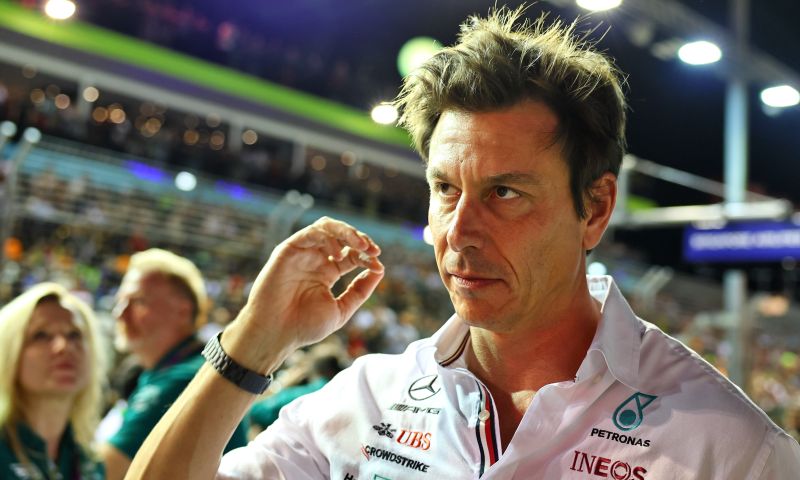Wolff celebrates ten years at Mercedes: a look back at his achievements
Column

- GPblog.com
This weekend, Mercedes celebrates a special anniversary: ten years ago, Toto Wolff signed his contract to become Mercedes team boss. A decision that proved to be unprecedentedly successful for both sides. Under Wolff's reign, one record fell after another. Below, we look back on a decade of Toto Wolff at the helm at Mercedes.
Many a screenwriter would love to have a character like Toto Wolff in his film or TV series. The Austrian has a special presence in the paddock. His stoic gaze and permanent scowl give the Mercedes team boss an intimidating look that shows that no matter how well things went, he is still not satisfied. When wins are made, a clenched fist goes up or a frugal smile can be seen. If things go wrong on the track, the desk gets smashed or some other object within reach has to take the hit.
Before his appointment as Mercedes team boss, Wolff already had a rich history, in every sense of the word. His investment companies Marchfifteenth and Marchsixteenth made Wolff a billionaire. Within motorsport, Wolff was on the board of Williams until 2012, although he retained a minority stake in the team until 2016. During his time at Mercedes, Wolff was also Valtteri Bottas ' manager and he still fulfils management duties for George Russell and Esteban Ocon. His contract as Mercedes team boss was signed on 21 January 2013.
The hybrid era
Wolff's first year at Mercedes did not remotely resemble what the team would later perform. Formula 1 legend Michael Schumacher left the team after a disappointing few years and was replaced by promising talent Lewis Hamilton. The decision was mocked at the time as the end of Hamilton's career. Although the team managed to take second place in 2013 with a narrow lead over Ferrari, Mercedes finished a whopping 236 points behind the untouchable Red Bull.
2014 changed everything. A new engine regulation went into effect and Mercedes was the undisputed winner of that change. Hamilton and teammate Nico Rosberg captured places one and two in the championship and Mercedes gained almost three hundred points more than Red Bull. It proved to be the harbinger for what was to come : from 2014 to 2020, Mercedes won every constructors' and drivers' title. The 'hybrid era' was absolutely dominated by Toto Wolff's Mercedes.
Records were strung together: most constructors' titles in a row, most drivers' titles in a row, Hamilton achieved the record for most races won, and with Hamilton's title in 2020, Michael Schumacher's record of seven world titles was also equalled. But under Wolff's leadership, the focus was not just on Formula 1. In 2018, Mercedes junior George Russell won the Formula 2 title and the same year Mercedes junior Mick Schumacher won Formula 3. In 2019, the Mercedes Formula E team was set up which won the title both times in the following two seasons.
2021 and 2022
In 2021, Mercedes' undisputed dominance finally came to an end. Max Verstappen was the first driver in years to challenge Hamilton. The battle for the title was decided in the much-discussed final lap of the final race. The season was heated: Wolff and his rival Christian Horner did not mince their words and accusations and insults flew back and forth every week. Mercedes' post-season protest was not recognised and it was official: Max Verstappen won the 2021 title. Mercedes still won the constructors' title for the eighth time in a row, but the season left a bitter taste in the mouth.
With the new 2022 engine regulations, all eyes were on the Silver Arrows. The team had made it clear it wanted revenge for the previous year's lost title and came up with a daring design on test days: Mercedes was the only team that had no sidepods. Was it the key to winning that no one else had discovered yet?
The answer was no. Mercedes' season was characterised by 'porpoising', the bouncing of the car around the track. Although Russell finished in the top five almost every race in his first season with Mercedes, Hamilton was regularly condemned to the midfield and there was by no means a title fight. The first victory only came in the penultimate race of the year and Mercedes had to make do with third place among constructors. Mercedes' dominant era is definitely over.
2023 and beyond
The future can only be guessed at this point. With the departure of James Vowles to Williams, Wolff has lost his chief strategist and right-hand man. Hamilton has still not signed a new contract. And the big question for 2023 is: has Mercedes got things back on track, or will it be a second year in a row where Red Bull is nothing more than a speck on the horizon?
In the long term, eyes turn to 2026. That is when new engine regulations go into effect again and Mercedes will have another chance to start a period of dominance. The question, however, is whether Wolff will stay on for that long. The Austrian has indicated in the past that his ambition does not stop at Mercedes' leadership. Will Wolff stick to a position in the paddock? Or will he follow in the footsteps of Jean Todt and make a bid for the presidency of the FIA? Only time will tell.

